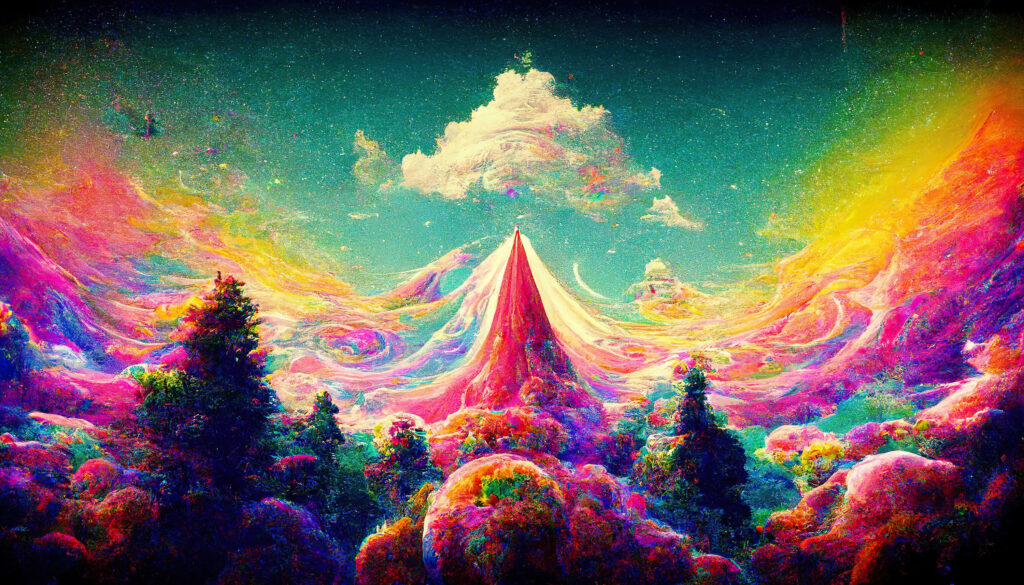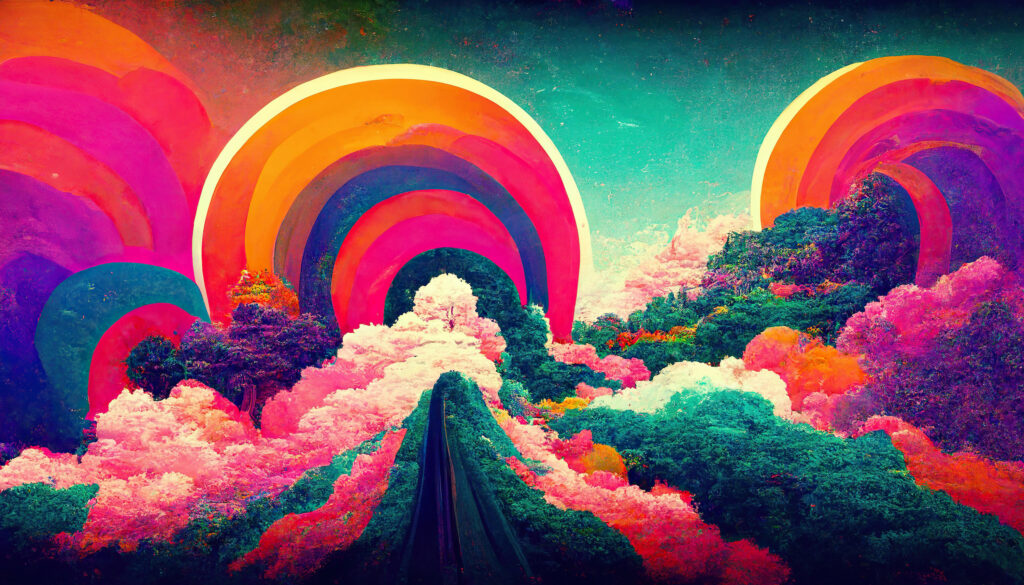You’ve probably heard that smoking cannabis prevents you from dreaming. Although you’d think going to bed “high” would invoke some colorful, mystical, fantasy-esque dreams, that isn’t the case. You simply close your eyes and wake up with no interlude of a dream to pass the night by.
Why is that? Are the effects of cannabis on dreaming permanent? Could cannabis’ dream-suppressing effects help combat PTSD-induced nightmares?

Does Cannabis Prevent You From Dreaming?
Now, cannabis doesn’t make it impossible to dream. You can still go to bed “high” and dream the night away. Generally speaking, though, most people who use cannabis report dreaming less or not remembering their dreams as frequently.
Depending on who you are, not dreaming could be a positive, a negative, or perhaps you’re utterly indifferent to it.
Why Are Dreams Important Anyways?
Debates over why we dream have long-since fascinated sleep, brain, and psychology experts alike. Despite countless years of research, there’s still no definitive answer as to why we dream.
Whether you believe dreams are of spiritual significance or think they’re just a bunch of nonsense, there are several prevailing theories surrounding this topic.
The most widely accepted theories say dreaming is essential for problem-solving and memory storage.
In a moderated discussion with psychologists and sleep experts Deirdre Barrett, Ph.D., and Kelly Bulkeley, Ph.D,, Dr. Bulkeley says she thinks of dreaming as a form of “play.”
“Dreaming is a kind of play,” Bulkeley begins. “You see some kids playing a game of house. Would you say their brain is malfunctioning, or that there’s something deficient about their cognitive processes? No, they’re engaged in play, which is a different kind of brain-mind behavior, a different way in which they engage in reality.”
Bulkeley then says she doesn’t believe dreaming is a lesser form of reality, just a different type of reality.
“When dreams get weird, bizarre, and strange, it’s not a bug, it’s a feature,” Bulkeley says. “It’s part of what dreaming can do.”
Dr. Barrett adds that during REM sleep — the stage in which most dreams occur — the logical part of the brain (the prefrontal cortex) is much less active than when we’re awake. The secondary visual cortex, which activates when trying to imagine something, is also much more active during REM sleep.
The result is dreaming of things that may not make sense or may not occur during the “waking” world.
Lastly, Barrett explains that REM sleep is important for restoring, repairing, and maintaining neurons and immune function.
How Cannabis Affects REM Sleep

First and foremost, there are five stages of sleep: NREM-1, NREM-2, NREM-3, NREM-4, and REM sleep. Although dreaming can occur during other stages of sleep, most dreams occur during the REM stage. Dreams that occur during REM sleep are also more vivid and intense.
It has been repeatedly observed that cannabis use is associated with a decrease in REM sleep. If you’re spending less time in REM sleep, you’ll dream less often.
At least, that seems to be the most logical explanation as to why cannabis use is associated with less frequent dreaming. That’s just a hypothesis, though.
Does Cannabis Prevent PTSD Nightmares?
Again, using cannabis doesn’t make it flat-out impossible to dream. However, using cannabis regularly is associated with dreaming less or being less likely to remember your dreams.
Recurrent nightmares are a common symptom associated with post-traumatic stress disorder. This can cause major sleep disturbance and may lead to the development of insomnia.
One Current Neuropharmacology review article says Δ9-THC and its synthetic analog nabilone have demonstrated a “high degree of success for long periods of time to effectively suppress nightmares in patients with PTSD.”
However, as another review article cautions, cannabis use may reduce the nightmares, anxiety, and sleep disturbances associated with PTSD — but it may also increase symptoms of depersonalization and derealization.
Depersonalization is a sort of detachment from one’s self. It’s the feeling of “being outside of your own body” or being “not real.” Derealization is a detachment from one’s surroundings. It’s the hazy feeling of being in a constant state of dreaming, like you’re in a movie or that the world around you isn’t real.
Individuals with depersonalization and derealization are aware of their symptoms and often feel isolated by them. They know they are real or that the world around them is real, but it doesn’t feel real to them. It’s believed depersonalization and derealization are the brain’s way of coping with severe trauma.
That being said, many veterans currently use medical marijuana and report that it helps manage their chronic pain and PTSD symptoms, including insomnia.
Are the Effects of Cannabis on Dreaming Permanent?
No. At least, not in my experience or in the experiences of anyone I’ve ever known. Even if you smoked or consumed cannabis every day for years, your ability to dream isn’t permanently altered.
In fact, most of the time, your dreaming becomes extra vivid and intense after you stop using cannabis for a few days or weeks. Whether they’re actually more intense or just seem more intense because you’re not used to dreaming regularly is sort of up in the air.
There aren’t many long-term studies on cannabis, let alone studies on the long-term effects of cannabis on dreaming. So it’s possible that in the future, scientists may find that cannabis has a lasting impact on dreams.
But from personal and empirical experiences, your dreams will return to “normal” (well, for as normal as dreams can be) once you stop using cannabis for a short time.
Key Takeaways: You May Dream Less After Using Cannabis

Whether you believe dreams are a window to the unconscious mind or you think they’re a bunch of nonsense, dreams play a vital — albeit mysterious — role in cognition and wellbeing.
Although there isn’t a concrete answer as to why we dream, the most widely accepted theories argue that dreams help with problem-solving and memory consolidation.
It has long since been observed that regular cannabis use is associated with a reduction in dreams or being less likely to remember your dreams. Cannabis use is associated with a decrease in REM sleep, which may explain why you don’t dream as often when you go to bed “high.”
While this may be a bummer for some, others see it as a positive. For example, there has been a growing interest in assessing the efficacy of cannabis for suppressing PTSD-induced nightmares.
Lastly, the effects of cannabis on dreaming don’t appear to be permanent — at least, based on personal and empirical experiences. However, our understanding of the relationship between cannabis and dreaming is bound to change as research advances in this area.
References
- Barrett, D. (2017, June 22). Dreams and creative problem-solving. Annals of the New York Academy of Sciences, 1406(1), 64–67. https://doi.org/10.1111/nyas.13412
- Zhao, H., Li, D., & Li, X. (2018, December). Relationship between Dreaming and Memory Reconsolidation. Brain Science Advances, 4(2), 118–130. https://doi.org/10.26599/bsa.2018.9050005
- Paulson, S., Barrett, D., Bulkeley, K., & Naiman, R. (2017, June 15). Dreaming: a gateway to the unconscious? Annals of the New York Academy of Sciences, 1406(1), 28–45. https://doi.org/10.1111/nyas.13389
- Think About Cannabis. (2022, April 4). Can THC and CBD Help Me Sleep? https://www.thinkaboutcannabis.com/health-wellness/can-thc-and-cbd-help-me-sleep
- Babson, K. A., Sottile, J., & Morabito, D. (2017, March 27). Cannabis, Cannabinoids, and Sleep: a Review of the Literature. Current Psychiatry Reports, 19(4). https://doi.org/10.1007/s11920-017-0775-9
- Mamelak, M. (2020, September 9). Nightmares and the Cannabinoids. Current Neuropharmacology, 18(8), 754–768. https://doi.org/10.2174/1570159×18666200114142321
- Rehman, Y., Saini, A., Huang, S., Sood, E., Gill, R., & Yanikomeroglu, S. (2021). Cannabis in the management of PTSD: a systematic review. AIMS Neuroscience, 8(3), 414–434. https://doi.org/10.3934/neuroscience.2021022
- Marijuana and Veterans Issues. (2021, September 29). NORML. https://norml.org/marijuana/fact-sheets/marijuana-and-veterans-issues/